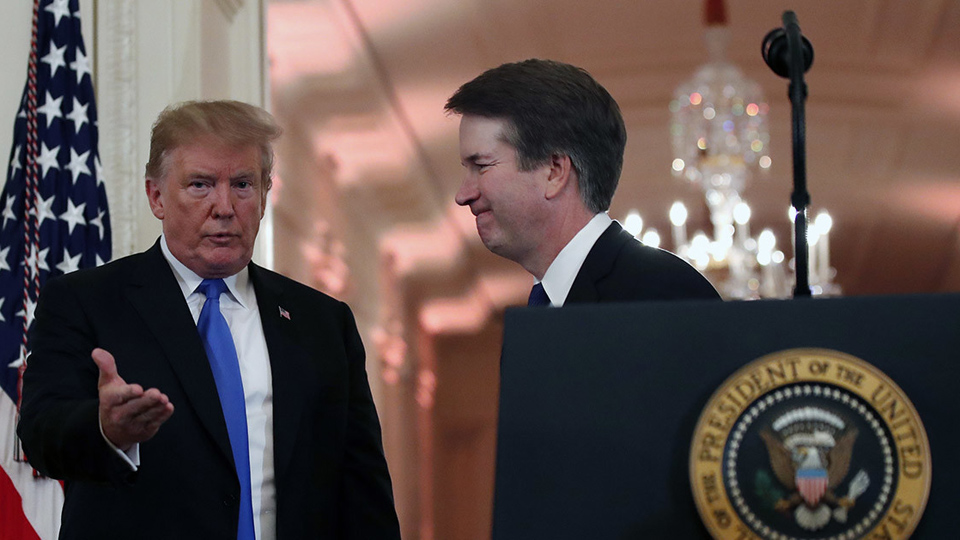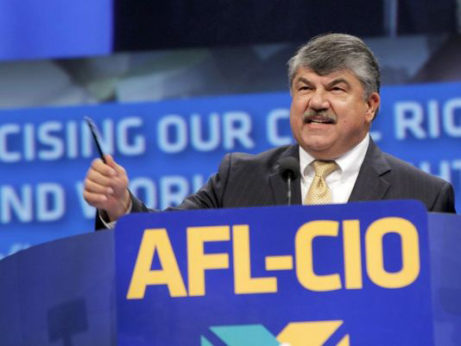
WASHINGTON—Federal appellate judge Brett Kavanaugh, anti-worker President Donald Trump’s nominee for a vacant U.S. Supreme Court seat, would “skew the court even more towards corporations and the elite,” AFL-CIO President Richard Trumka says.
And in the process, Trumka adds, that tilt would further destroy trust in the tribunal as an impartial, balanced institution of the federal government, he adds.
“Working people expect the Supreme Court to be the most-fair branch of our government. Does anybody believe that’s true any more?” he asked. And a Supreme Court tilt, Trumka warned, “does a tremendous disservice to the country.”
Trumka blasted the Kavanaugh nomination at an August 1 breakfast with reporters, hosted by the Christian Science Monitor. Other topics of his talk included the coming mid-term elections, NAFTA talks and what labor hopes to see from them and increased worker activism nationwide.
“The Supreme Court shouldn’t be a Republican Supreme Court or a Democratic Supreme Court,” he told People’s World afterwards.
All this comes against a background of the court’s tilt towards the 1 percent. Trumka cited a recent study by University of Chicago law professor – and former federal appellate judge – Richard Posner, showing the current High Court “is more corporate-friendly than any in our history.”
That court, in one of its final decisions, voted 5-4 – with the five GOP-named justices in the majority – to overturn 43 years of labor law and make every state and local government worker in the U.S., from janitors to nurses to police to teachers, potential “free riders” who could use union services without paying one red cent for them.
A statistical analysis from the University of Illinois says the anti-union Janus ruling will cost unions millions of dollars and more than 700,000 members combined, over time, weakening their power to defend workers and their rights. Trumka said current Justice Samuel Alito “solicited” Janus years before. Alito wrote the Janus decision. His footnote in another case four years ago started the saga.
That Janus majority included Justice Anthony Kennedy, who retired July 31. Kennedy was the “swing vote” on the tribunal in recent years. Kavanaugh would not be like him, Trumka said.
The AFL-CIO joined 150 other groups last month in formally opposing Trump’s nomination of Kavanaugh. Their letter, authored by the Leadership Conference on Civil and Human Rights, cited his anti-civil rights rulings and his anti-worker rulings.
It also noted Kavanaugh’s opposition to reproductive choice, his refusal to hold any president accountable during his term in office and his willingness to ignore or overturn federal regulatory agency rulings, including National Labor Relations Board rulings for workers. Trumka cited Kavanaugh’s presidential stand and anti-agency rulings, too.
“He has a radical view of what check the Senate and House should be on a president,” Trumka said. Kavanaugh has said a sitting president should not be subject even to questioning in civil or criminal cases, much less indictment. That could affect his view of Trump’s role if cases involving Russian pro-Trump sabotage of the 2016 presidential election reach the High Court.
Kavanaugh also “doesn’t believe that a safety agency,” such as the Occupational Safety and Health Administration, “or the NLRB should be given any deference or respect” when business legally challenges its regulations and rulings, Trumka stated. “He (Kavanaugh) has no sense of precedent,” said Trumka, who has a law degree.

If Kavanaugh holds that position, as Trump’s prior High Court nominee, current Justice Neil Gorsuch, does, that would also overturn a 34-year-old precedent, called Chevron deference.
The justices ruled, in a 1984 case involving Chevron Corp., that federal judges should defer to an agency’s expertise in its field, unless foes prove the agency hugely erred in its reasoning, its precedents or in following accountability rules.
Trump and Senate Majority Leader Mitch McConnell, R-Kent., want to push Kavanaugh through the Senate before the November election and preferably before the High Court starts its new term on the traditional “first Monday in October.”
The GOP holds a 51-49 Senate majority, though John McCain, R-Ariz., is absent, battling brain cancer. Due to a change in Senate rules, the 47 Democrats and two Democratic-leaning independents cannot filibuster Kavanaugh. Six senators face a lot of pressure on their votes.
Four are Democrats – Indiana’s Joe Donnelly, Missouri’s Claire McCaskill, North Dakota’s Heidi Heitkamp and West Virginia’s Joe Manchin – who seek re-election this fall in states Trump carried overwhelmingly in 2016. Kavanaugh also has to worry about two pro-choice Republicans, Alaska’s Lisa Murkowski and Maine’s Susan Collins.
Kavanaugh is making the rounds of senators’ offices, and spoke behind closed doors with Manchin for two hours on July 30. The senator emerged non-committal. Meanwhile, right-wing special interests have already launched a multi-million-dollar ad campaign to force senators to kowtow to Trump and vote for Kavanaugh. The right is even running ads in states like Illinois, whose two Democratic senators are considered sure anti-Kavanaugh votes.
What Trumka wants from Kavanaugh is not ideology, but a commitment to the people – all the people.
“He should be fair, independent, and committed to protect the rights and safeguards of everyone. It’s an important issue for the country and for the direction of the country,” he says.












Comments